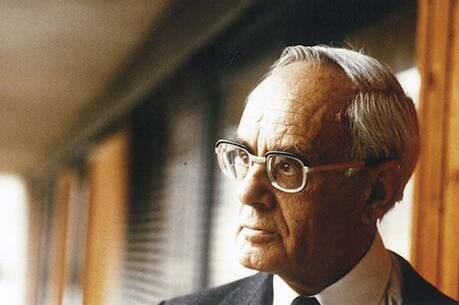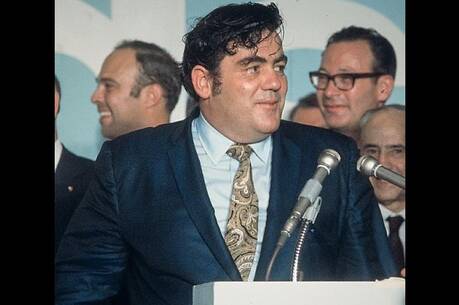Three in One
In June 1994, in an Italian restaurant in Baltimore, Michael Downey met with his friend and colleague, Catherine Mowry LaCugna, a professor of theology at the University of Notre Dame. Together, over linguini and Lonergan, they hatched a plot. Lamenting the notoriously dense and complex language surrounding theological treatises on the mystery of the Trinity, they laid plans for a small book that would speak at last in terms that would not only make sense, but would capture the imagination and actually reach down into the lives of contemporary seekers.
Sickness intervened, and in the midst of an outstanding teaching career, LaCugna was stricken with cancer. She died at the age of 44 on May 3,1997. Downey promised her before her death that he would carry their project forward. This book is the fulfillment of that promise and surely a tribute worthy of Downey’s esteemed friend, who inspired him to carry on the task. Readers hungry for a spirituality that addresses the real world they live in will be the beneficiaries of their spiritual friendship.
Any discussion of a Trinitarian spirituality must first address the question: Where did the idea of a God who is three in one originate? Downey, a professor of systematic theology at Saint John’s Seminary in Camarillo, Calif., and a popular writer on spiritual themes, traces the first hints in the Hebrew Scriptures. There God is named or addressed as Father roughly 20 times, a term conveying a sense of involvement, responsibility, commitment, compassion, relationshipall words with affective connotations.
In the life and story of Jesus of Nazareth, the predominant name by which God is called upon is Father, with Jesus being called the unique Son. Jesus, the Son, promises to send the Spirit, as a gift. The basis for the doctrine of the Trinity lies in this language of Father, Son and Holy Spirit. In early Christian centuries knotty questions emerged centering around how to formulate teaching that would safeguard the notion of equal sharing of divinity among the three while assuring the distinctiveness and unique activity of the three who are one God. There was a need to move from the poetic to the propositional, from the abundance of scriptural images and metaphors to more precise ideas.
But this movement from the poetic, with its rich images and metaphors for God, such as shepherd, rock, fortress, to more precise ideas is not without problems of its own. Downey points out that with a sharp focus on doctrine the emphasis easily turns to a detached, speculative approach, removed from reference to the human condition, from the affective and imaginative.
The singular achievement of Downey’s work is that he moves deftly in the opposite direction: dense, abstract theological notions are expressed in prose on the brink of poetry. In Altogether Gift, chilly doctrines are expressed in a way that moves the heart to prayer.
Downey’s work rests on two key notions: gift and grammar. The doctrine of the Trinity, for Downey, provides a fuller explication of the biblical affirmation God is Love. (1 John 4:8) In his telling, Love is the life that pours itself forth as gift. God is Giver, Given and Gift/ing or, in the grammar of the Trinity, Father, Son and Spirit. As Downey puts it: Grammar has to do with a way of speaking correctly. Rules of grammar set the limits within which creative discourse can take place. Rules of grammar do not guarantee that we will speak the truth, but if we are to speak in a meaningful and coherent way, we must work within the rules of grammar. And what we seek to speak of is the God whose name above all names is Love. This we do through the language of Father, Son and Spirit, the doctrine of the Trinity, which is the grammar of gift.
Sifting through the maze of doctrinal formulations relating to Trinitarian theology, Downey homes in on one constant: relationship. God is not a self-contained individual, but one whose very being is constituted by the relations of interpersonal love. Person, in God, is always being toward’ another, for the other, in relation.
For Downey this is foundational and key to his thesis. His real interest in explaining the rules of the Trinitarian grammar is to bring the reader to a deeper understanding of human personhood. God does not exist in sublime isolation. Neither do human beings:
Human personhood is not something achieved in autonomy or independence or self-determination or self-sufficiency. Rather, human personhood is received in self-donation, being toward, always toward the other and others in relation. We come from others, we live with others. Our being is toward and for others. We come to ourselves only through and with others.
The three in one Love, though distinct, are equal. Hence: Though we are different and distinct from one another, there is to be no subordination among us: woman to man, black to white, poor to rich, simple to smart, gay to straight.
Jesus, the Word in flesh, is the manifestation of what it means to be fully human. But becoming flesh, Downey suggests, refers not only to the conception and birth of Jesus from the flesh of Mary, but also to the embrace of the human condition in its entirety, in the whole life and ministry, passion, dying, death, and raising of Christ to new life.
Downey takes seriously this embrace of the human condition in its entirety, following its reach into the most ordinary places of our lives:
Our life, every inch and ounce of it, every moment of it, is to be lived in the presence of the divine. In the tub and at the table. In our resting and our rising. In childbearing and child rearing. In sickness. In listening. In stripping and clothing. In primping and in perfuming. In traveling. In the delight of sexual intimacy. But especially in our brokenness and in our vulnerability. All these ordinary and quite mundane human realities are paths to communion in the one Love.
This is a Trinitarian spirituality that is accessible, within our reach.
Many readers will find the last chapter a special treat. Setting aside the professorial role, Downey invites the reader to end the discussion in silent, meditative prayer. In the final chapter, entitled In Prayerful Communion, he offers 15 points for reflection, gently reminding the reader, This chapter is not to be read like the other chapters of this book. Rather, each point for reflection is to be considered slowly, carefully. To make sure we don’t put the book down and move too quickly on to something else, he challenges: Do not rush through. Where will you be when you get to where you think you are going? He answers: Nowhere at all, if not in communion with the three in one Love.
Here is a book that lives up to its title. It is altogether gift.
This article also appeared in print, under the headline “Three in One,” in the February 26, 2001, issue.








